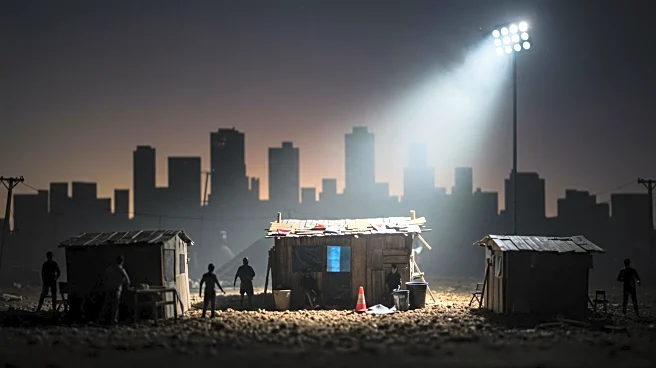What's Happening?
President Trump has initiated a campaign to clear homeless encampments in Washington, D.C., deploying 800 National Guard troops to assist local police in the effort. This move is part of the 'Making D.C. Safe and Beautiful Task Force,' aimed at addressing crime and homelessness in the capital. The operation has involved federal law officers and local police dismantling camps, with some residents expressing fear and frustration over the abrupt enforcement. Individuals affected by the clearances, such as Ms. Jay and Andrew S., have shared their experiences of being forced to relocate, highlighting the tension between federal authorities and the homeless community.
Why It's Important?
The initiative underscores the ongoing debate over how to address homelessness in urban areas, particularly in high-profile locations like Washington, D.C. While the administration views the effort as a necessary step to improve safety and aesthetics, critics argue it overlooks the human aspect of homelessness, treating individuals as nuisances rather than addressing underlying issues. The Episcopal Diocese of Washington and other advocates have voiced concerns about the ethical implications of forcibly removing people from their temporary homes. This action could have broader implications for public policy and social services, potentially influencing how other cities approach similar challenges.
What's Next?
The operation is expected to continue, with local police tasked with handling the clearances in a more humane manner than federal authorities. Advocacy groups like the National Homelessness Law Center are monitoring the situation, emphasizing the need for transparency and humane treatment. The ongoing enforcement may lead to increased tensions between the government and homeless advocates, potentially sparking legal challenges or policy debates. The administration's approach could also influence future strategies in other cities facing similar issues.
Beyond the Headlines
The initiative raises questions about the balance between urban development and social responsibility. The ethical considerations of forcibly removing homeless individuals highlight the need for comprehensive solutions that address the root causes of homelessness, such as affordable housing and mental health support. The cultural and societal implications of this approach may lead to a reevaluation of how cities manage public spaces and support vulnerable populations.









